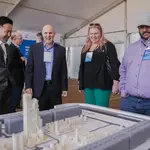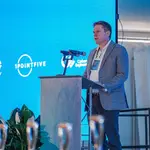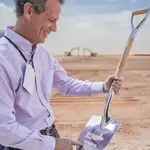https://youtube.com/watch?v=B8qaXXD7NgY%3Fautoplay%3D0%26mute%3D0%26controls%3D1%26loop%3D0%26origin%3Dhttps%253A%252F%252Fwww.1pointfive.com%26playsinline%3D1%26enablejsapi%3D1%26widgetid%3D1
On Friday, April 28, 1PointFive, a carbon capture, utilization and sequestration (CCUS) company, held a groundbreaking ceremony for its first-of-its-kind DAC facility, STRATOS. 1PointFive was joined by project partners from Oxy, Carbon Engineering and Worley for the shovel turn.
The first stage of construction, which includes site preparation and road work, has already begun and startup is expected in mid-2025. Once fully operational, STRATOS is expected to capture up to 500,000 metric tonnes of carbon dioxide per year. 1PointFive has announced a scenario to deploy 100+ DAC facilities worldwide by 2035 under current compliance and market scenarios.
The facility’s name, STRATOS, is a nod to the natural systems the project seeks to protect and restore. DAC is a technology that captures and removes large volumes of CO₂ directly from the atmosphere, which can be safely and securely stored deep underground in geologic formations. DAC provides a practical solution for hard-to-decarbonize activities, such as air travel, to help achieve climate goals.
“Sometimes history puts you in the right place at the right time with the tools you need to do something extraordinary. Together, we, with our partners and supporters, have seized this moment to start the deployment of large-scale Direct Air Capture around the world which will make a difference for our world, our company, and our communities.”
– Vicki Hollub, Oxy President and CEO

The plant is expected to provide cost-effective solutions these industries can use in conjunction with their operational reduction programs to help reach their net-zero goals.
“Today’s STRATOS groundbreaking marks a major milestone,” said 1PointFive President, Michael Avery. “The IPCC reports make it clear: Direct Air Capture will have an important role to play in restoring our climate and helping the world meet the Paris Agreement’s climate goals. Operational reduction needs to happen today, but it needs to happen in conjunction with carbon removal technologies like DAC.”
“This first facility will not just be a milestone in size, but a cornerstone of learning, forming how we optimize Direct Air Capture plants going forward.”
– Michael Avery, 1PointFive President
1PointFive has advanced product sales for the plant, including carbon removal credit purchases from Airbus, Shopify and ThermoFisher. The project is expected to employ more than 1,000 people during the construction phase and up to 75 once operational.
“At 1PointFive, our mission is to curb global temperature rise,” said 1PointFive Vice President, Anthony Cottone. “This is an ambitious project because we know that Direct Air Capture will have an important role to play in restoring our climate.”
WATCH SPEAKER REMARKS
VIEW EVENT PHOTOS








